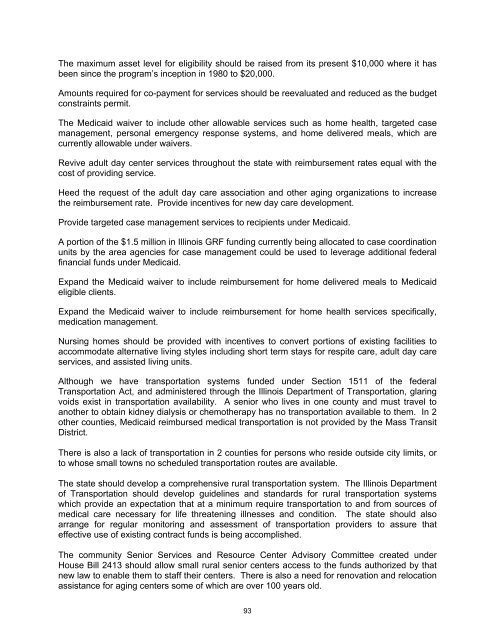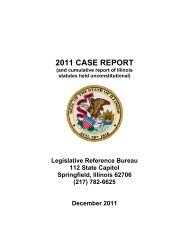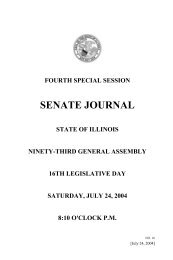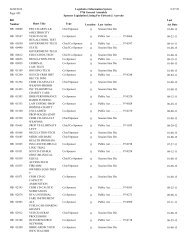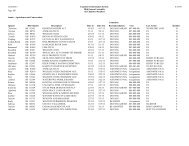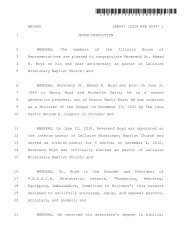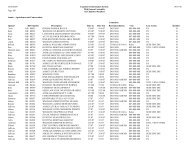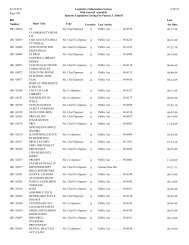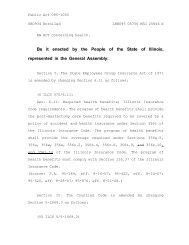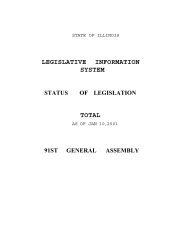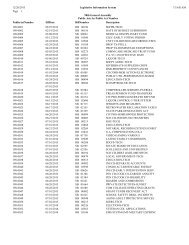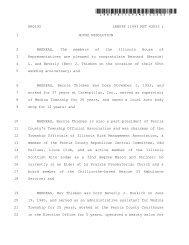Long-Term Care - Illinois General Assembly
Long-Term Care - Illinois General Assembly
Long-Term Care - Illinois General Assembly
Create successful ePaper yourself
Turn your PDF publications into a flip-book with our unique Google optimized e-Paper software.
The maximum asset level for eligibility should be raised from its present $10,000 where it has<br />
been since the program’s inception in 1980 to $20,000.<br />
Amounts required for co-payment for services should be reevaluated and reduced as the budget<br />
constraints permit.<br />
The Medicaid waiver to include other allowable services such as home health, targeted case<br />
management, personal emergency response systems, and home delivered meals, which are<br />
currently allowable under waivers.<br />
Revive adult day center services throughout the state with reimbursement rates equal with the<br />
cost of providing service.<br />
Heed the request of the adult day care association and other aging organizations to increase<br />
the reimbursement rate. Provide incentives for new day care development.<br />
Provide targeted case management services to recipients under Medicaid.<br />
A portion of the $1.5 million in <strong>Illinois</strong> GRF funding currently being allocated to case coordination<br />
units by the area agencies for case management could be used to leverage additional federal<br />
financial funds under Medicaid.<br />
Expand the Medicaid waiver to include reimbursement for home delivered meals to Medicaid<br />
eligible clients.<br />
Expand the Medicaid waiver to include reimbursement for home health services specifically,<br />
medication management.<br />
Nursing homes should be provided with incentives to convert portions of existing facilities to<br />
accommodate alternative living styles including short term stays for respite care, adult day care<br />
services, and assisted living units.<br />
Although we have transportation systems funded under Section 1511 of the federal<br />
Transportation Act, and administered through the <strong>Illinois</strong> Department of Transportation, glaring<br />
voids exist in transportation availability. A senior who lives in one county and must travel to<br />
another to obtain kidney dialysis or chemotherapy has no transportation available to them. In 2<br />
other counties, Medicaid reimbursed medical transportation is not provided by the Mass Transit<br />
District.<br />
There is also a lack of transportation in 2 counties for persons who reside outside city limits, or<br />
to whose small towns no scheduled transportation routes are available.<br />
The state should develop a comprehensive rural transportation system. The <strong>Illinois</strong> Department<br />
of Transportation should develop guidelines and standards for rural transportation systems<br />
which provide an expectation that at a minimum require transportation to and from sources of<br />
medical care necessary for life threatening illnesses and condition. The state should also<br />
arrange for regular monitoring and assessment of transportation providers to assure that<br />
effective use of existing contract funds is being accomplished.<br />
The community Senior Services and Resource Center Advisory Committee created under<br />
House Bill 2413 should allow small rural senior centers access to the funds authorized by that<br />
new law to enable them to staff their centers. There is also a need for renovation and relocation<br />
assistance for aging centers some of which are over 100 years old.<br />
93


